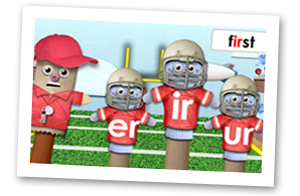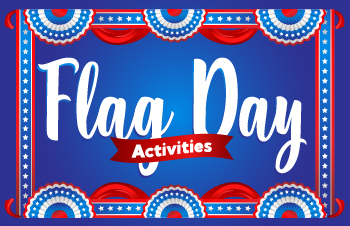Preschool Reading Activities & Curriculum Standards
Preschool age children are excited to learn. Curiosity is at a premium, making this the perfect age to lay a solid foundation for literacy skills. PreK learners do well with a blend of interactive lessons, learning games, hands-on activities including printable worksheets, solid assessment methods, and positive reinforcement. Guided reading will also be at the heart of a preschool reading program.
Preschool language arts lessons will incorporate all strands of English language arts. These include vocabulary development, reading comprehension, literature, writing strategies, writing applications, English language conventions, listening and speaking. While it may seem too early, the introduction of these concepts play a key role in your preschooler’s reading program.
Preschool Reading – What are the Standards and Curriculum?
There are multiple steps in helping your child become proficient at reading. Think of each step as a rung on a ladder – moving your child closer to opening a world of limitless imagination and knowledge. At this early stage, your preschool child will develop a basic understanding of reading skills, decoding, and phonics.
Time4Learning’s award-winning preschool program combines technology, animated characters, original stories and enjoyable music to inspire a love of learning in the littlest e-learners. By presenting a comprehensive preschool reading curriculum which is fun and engaging for young children, Time4Learning builds a solid foundation in the following language arts strands:
4 Steps to Teach Preschool Reading
- Vocabulary Development: A preschool reading program helps children learn the basic features of phonics and the alphabet.
- Language Arts & Reading Comprehension: Time4Learning’s preschool language arts activities will present your child with opportunities to read simple two and three letter words.
- Literary Response: A preschool reading program thrives off guided reading, appropriate to the preschool level, with lots of colorful pictures to help children visualize the story.
- Writing Applications and Reading Strategy: Preschool age children often appreciate opportunities to showcase their work through hands-on activities.
Vocabulary Development
Vocabulary development plays an important role on the path to reading. Children move from identifying and drawing shapes to naming and writing letters. Singing ‘The Alphabet Song’ takes on new meaning as letter sounds are discovered. Your son or daughter will delight in showcasing their newfound skills as those sounds become words. At a PreK level children will:
- Recognize and name both uppercase and lowercase letters
- Understand letters combine to form words
- Discover words may join to make sentences
- Find that sentences unite to form their favorite stories
- Define new words through story context and repetition
- Relate the meaning of words to the world around them
Phonics are a vital building block in a preschool reading program. Children can use phonics as a way to decode words and develop reading skills including:
- Learning letter sounds for phonological awareness (a as in apple; b as in ball)
- Moving towards phonemic awareness through playing rhyming activities, word and sound games (replacing ‘b’ in b-a-t with a ‘c’ makes a new word: c-a-t)
- Distinguishing similar sounds as distinctive words (‘three’ has a different meaning than ‘free’ or ‘tree’)
Pre-reading skills such as phonemic awareness, phonological awareness, and the alphabet are taught in a sequence that builds skills progressively, before moving students into phonics and reading comprehension. Time4Learning offers a rich environment of visual and auditory lessons to inspire your pre-reader to learn more!

The language arts is GREAT for helping with phonics and beginner reading skills... Plus, the lessons are thoroughly entertaining!
Here at Letter Stadium, first graders learn about "r-controlled vowels" from the Phonics Football Players.

Language Arts & Reading Comprehension
Guided reading, reading worksheets, language arts games, and many other creative methods make the preschool reading program fun for young children. Time4Learning’s preschool language arts activities will present your child with opportunities to read simple two and three letter words.
You’ll likely find your little one will take their newfound skills of matching pictures with words out for a test drive in everyday life. Imagine how pleased they will be to ‘read’ the word ‘dog’ the next time you head to the park!
Throughout the preschool reading program, children are exposed to various tenets of reading comprehension. At this stage you can expect your child will:
- Recognize stories have a beginning, middle, and end
- Discover pages are turned left to right; words are read top to bottom
- Focus on a sequence of events in a story
- Be able to retell simple stories
- Learn to pay attention to the main details of a story and answer related questions
Watch as your child’s reading comprehension skills continue to grow. Pretty soon they will be checking to see if you are paying attention.
Literary Response
Picture books are a fan favorite among the preschool set. Time4Learning taps into this interest by offering numerous colorful picture books geared specifically to this level. Within this PreK reading program your child will find:
- Books with simple storylines, easy sentences, vibrant pictures, and plenty of action
- Books which include alphabet, colors, sizes, shapes, and numbers
- Non-fiction topics including topics on animals, geology, and weather
- Fiction works including adventure stories, books about family life and animals, and humor
Children this age thrive on repetition. The good news? Within Time4Learning you aren’t the one reading the same story ten times in a row!
*Reading Standards are defined by each state. Time4Learning bases its use of reading standards on the national bodies that recommend curriculum and standards and the interpretations of it by a sampling of states notably Florida, Texas, and California.
Writing Applications & Reading Strategy
Preschool age children often appreciate opportunities to showcase their work through hands-on activities. Your child will:
- Learn to hold writing instruments, whether they be crayons, pencils, felt pens, or paintbrushes
- Gain writing confidence through artistic expression
- Practice pre-writing activities including drawing, coloring and painting
- Work on fine motor skills as they practice copying letters and words
- Learn to follow instructions (Circle the cow; draw an X on the frog)
Speaking orally is another key component of the preschool reading strategy. Your PreK student will enjoy learning and reciting simple rhymes, songs and finger plays. Related worksheets provide reinforcement encouraging your child to match the printed words with those they have learned.
Time4Learning’s preschool reading program will help your child meet the benchmarks for Kindergarten reading readiness.









